In modern data-driven enterprises, the role of Data Engineering stands as a cornerstone for effective data management and utilization. As businesses rely on data to make their decisions, the demand for adept Data Engineers has surged substantially.
Research shows almost 400% increase in data engineer job postings over the last five years.
In this article, we will explore essential data engineering skills. From data modeling and integration to programming proficiency, we will list the data engineer skills required to build a career in data engineering.
By the end of the article, you will understand what a data engineer does and the key roles and responsibilities in the modern organization. We will also analyze the data engineer job description to help you excel in the field.
Get a more detailed insight: Data Engineering & Other Job Roles
Who is a Data Engineer?
A Data Engineer is a skilled professional responsible for designing, constructing, and maintaining the data architecture and infrastructure. They collect, process, and store vast amounts of data securely and organized . Working with data scientists and analysts, data engineers play an important role in enabling data-driven decision-making within organizations.
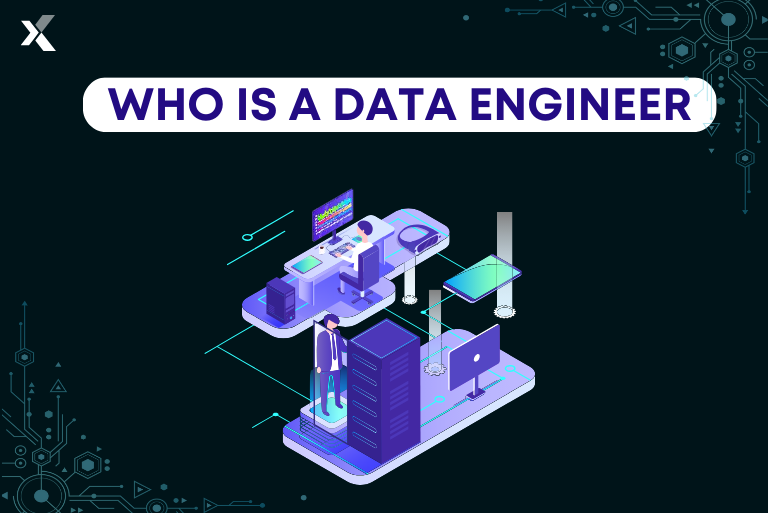
Data engineers typically have expertise in software engineering, database architecture, distributed systems, and machine learning. They must create scalable and efficient data pipelines to handle dynamic demands.
These pipelines, often utilizing ETL (Extract, Transform, Load), extract data from various sources, transform it into usable formats, and load it into storage systems or warehouses. This process guarantees clean, reliable, and accessible data for analysis.
Data engineers need strong programming skills (Python, Java, Scala) and proficiency in tools like Apache Spark, Hadoop, and ETL frameworks. Collaboration with cross-functional teams is crucial for understanding data requirements and optimizing databases.
Engineers ensure data quality, security, and compliance through effective governance. In the evolving data landscape, they are vital in enhancing operations, improving products, and elevating customer experiences.
Indeed, developing these skills is your gateway to a successful Data Engineering career. Take a step towards your career with AnalytixLabs, and enroll in our Data Engineering course today. Explore our signature data science courses and join us for experiential learning that will transform your career. We also have comprehensive and industry-relevant courses in machine learning, AI engineering, and Deep Learning. Explore our wide range of courses. P.S. Check out our upcoming batches or book a free demo with us. Also, check out our exclusive enrollment offers
What Does a Data Engineer Do?
Data engineer responsibilities are pivotal in constructing and maintaining the foundational infrastructure necessary for effective data management within an organization. They design, develop, and optimize data pipelines that facilitate the seamless flow of information from diverse sources.
-
Collaborates with Data Scientists
Besides these skills required for data engineering, collaborating closely with Data Scientists, Analysts, and stakeholders is also necessary. Data Engineers must ensure that raw data is transformed through Extract, Transform, Load (ETL) processes into a format suitable for analysis. They design, develop, and manage large-scale data systems used for analytics.
Data engineers provide the infrastructure necessary to gather, store, process, and analyze data to support organizational decision-making.
-
Maintain Data Storage Solutions
Data engineers need proficiency in Python, Java, or Scala for coding ETL processes and developing data integration solutions. They excel in working with diverse database systems (SQL, NoSQL, columnar stores) to design and maintain robust data storage solutions.
Involved in all stages of data solution development, from research to deployment, data engineers construct pipelines, extract data, perform transformations, and design algorithms for analytics applications to uncover business trends.
-
Data Modeling
The role extends to data modeling, where data engineering skills are used to design schemas and structures to optimize data storage and retrieval. Scalability and performance are central considerations, as they craft solutions capable of handling large volumes of data efficiently.
Troubleshooting data quality issues, addressing latency concerns, and ensuring data security are all part of the Data Engineer’s purview.
In essence, Data engineers are essential contributors to modern businesses, bridging the gap between raw data and actionable intelligence. Their work forms the backbone of an organization’s data ecosystem, enabling data-driven decision-making, strategic insights, and innovation.
Data Engineer Job Description
Data Engineers are responsible for all aspects of the data life cycle, from curating and analyzing data to building and managing the databases. They design, build, maintain, and troubleshoot databases that store valuable organizational information.
Data engineers’ job description includes overseeing the data pipeline, designing, developing, and integrating different databases. They must also ensure that data is secure and properly organized.
Here’s an in-depth data engineer description focusing on distinct responsibilities:
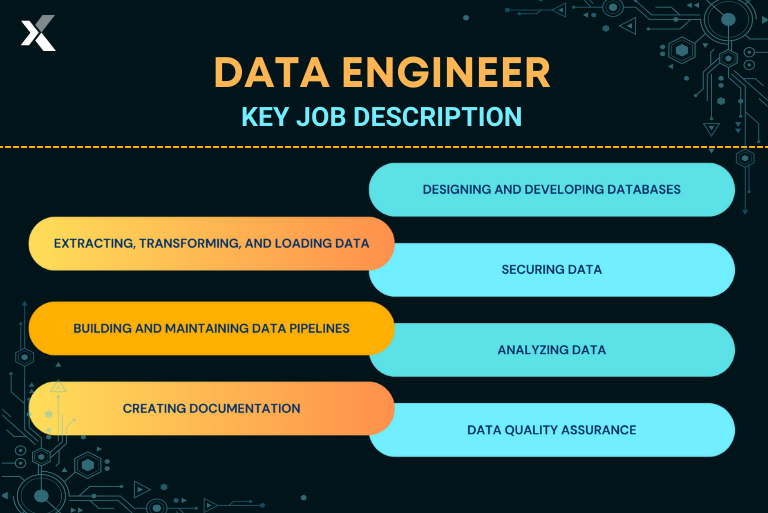
-
Designing and Developing Databases
Data engineers design, develop, maintain, and troubleshoot databases for organizations. They use software engineering principles to create databases that store valuable information in an organized manner.
-
Extracting, Transforming, and Loading (ETL) Data
Data engineers extract data from various sources like websites, applications, and APIs. They also create programs to transform the data into a format suitable for storing in databases, as well as load it into databases.
-
Securing Data
Data engineers ensure the data is securely stored and protected from unauthorized access or manipulation. It includes creating data backups, encrypting sensitive information, and implementing authentication protocols to restrict access rights.
-
Building and Maintaining Data Pipelines
Data engineers must also build and maintain data pipelines, which involve extracting, transforming, and loading data from different sources into a central repository. This ensures that data is properly organized and can be used for analysis.
-
Analyzing Data
Data engineers analyze complex datasets to uncover patterns or trends that organizations can use to make decisions. They perform statistical analysis, create visualizations or dashboards, and develop machine learning models to understand the data better.
-
Creating Documentation
Data engineers also create technical documentation, such as user manuals, process flow diagrams, system architecture diagrams, etc., that help other users understand the underlying systems and processes involved in managing data.
-
Data Quality Assurance
Data engineers are responsible for ensuring the accuracy and quality of data. It includes validating data from various sources, cleaning it to eliminate inconsistencies, and standardizing formats.
Also read: Data Engineering Interview Cheat Sheet
Different Data Engineering Roles to Explore
Data engineer roles and responsibilities constantly evolve as new technologies emerge and the data-driven landscape adapts to changing business needs.
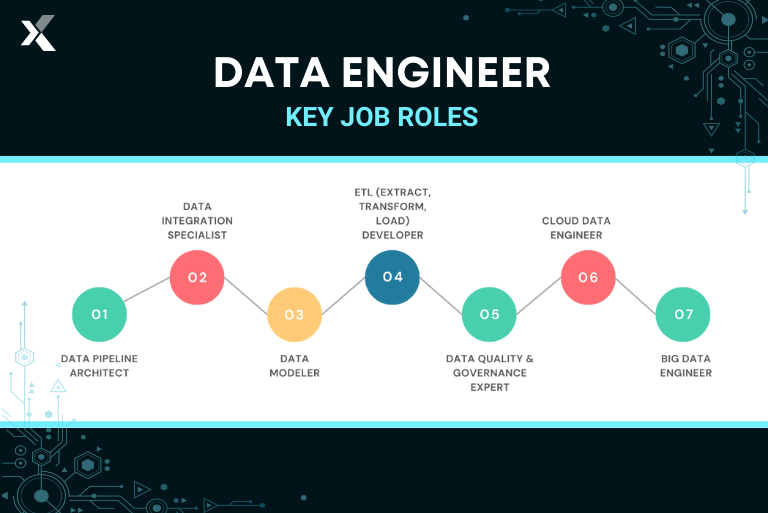
Here is an overview of the key roles of data engineers across industries:
1. Data Pipeline Architect
Data Engineers design and build data pipelines, which are the lifeblood of any data-driven organization. These pipelines are responsible for the collection, transformation, and delivery of data from various sources to their destination, usually a data warehouse or a data lake. Data Pipeline Architect’s need to:
- Choose appropriate technologies for data ingestion and processing
- Ensure data quality and reliability
- Optimize pipelines for performance and scalability.
2. Data Integration Specialist
Data Integration Specialists play a vital role in harmonizing data from disparate sources in the ever-expanding landscape of data sources and formats. They are responsible for:
- Creating connectors or APIs to fetch data from sources like databases, APIs, and logs
- Transforming data to a standardized format for analysis
- Managing data versioning and lineage
3. Data Modeler
Data Engineers work closely with Data Scientists and Analysts to ensure that data is structured in a way that makes it easy to analyze. Data Modelers:
- Design data schemas and databases
- Define relationships between different data entities
- Optimize data structures for efficient querying
4. ETL Developer (Extract, Transform, Load)
ETL Developers are experts in data transformation. They are responsible for:
- Extracting data from source systems
- Applying various transformations like data cleansing, aggregation, and enrichment
- Loading the transformed data into the target storage
5. Data Quality and Governance Expert
Ensuring data quality and compliance with regulations is paramount. The data engineer skill set is implemented by Data Quality and Governance Experts to:
- Implement data quality checks and validation rules
- Monitor data quality metrics and perform data cleansing as necessary
- Ensure compliance with data privacy and security standards
6. Cloud Data Engineer
With the rise of cloud computing, Cloud Data Engineers are in high demand. The data engineer job requirements they fulfill are:
- Deploying and managing data infrastructure on cloud platforms like AWS, Azure, or Google Cloud
- Leveraging cloud-native services for data processing and storage
- Optimizing costs while maintaining performance and scalability
7. Big Data Engineer
Big Data Engineers are essential for handling massive datasets. They use data engineering skills like:
- Work with distributed data processing frameworks like Hadoop, Spark, or Flink.
- Build data solutions that can scale horizontally.
- Optimize performance for large-scale data operations.
Also read: What is Big Data Engineering?
Data Engineer: Understanding Job Responsibilities
Data Engineers are the masterminds behind collecting, preparing, and processing data into useful insights that drive business success. As technology matures, their roles and responsibilities will continue to expand and evolve to meet the demands of the modern data-driven world.
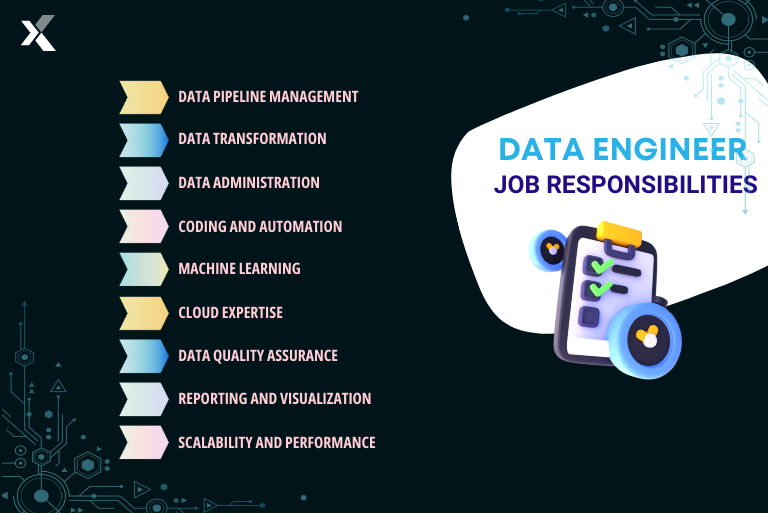
The critical data engineer responsibilities include the following:
1. Data Pipeline Management
Data engineers design, construct, and maintain data pipelines. These pipelines act as data highways, ensuring a smooth and secure data flow from source to destination. Their proficiency in tools like Apache Spark, Apache Kafka, and ETL (Extract, Transform, Load) processes is fundamental to this role.
2. Data Transformation
They clean, transform, and structure raw, often messy, data into usable formats. This process, known as data wrangling, ensures that data is consistent, accurate, and ready for analysis.
3. Database Administration
Data Engineers manage databases, deciding which type of database (SQL or NoSQL) is best suited for specific use cases. They optimize database performance, scalability, and security.
4. Coding and Automation
Proficiency in programming languages like Python, Java, Scala, or Ruby is essential. Data Engineers write code to automate data processes, reducing manual effort and increasing efficiency.
5. Machine Learning
Data Engineers are experts in machine learning and AI methods, understanding how to use algorithms to extract meaningful insights from data. Their expertise helps businesses make more informed decisions and improve operational performance.
6. Cloud Expertise
With the proliferation of cloud computing, it is crucial that Data Engineers are versed in cloud technologies. They work with cloud platforms such as Azure, AWS, or Google Cloud, utilizing cloud services for data storage, processing, and retrieval.
Ensuring data security and compliance with best practices is paramount. They must ensure optimal utilization of cloud resources and build distributed systems on the cloud.
7. Data Quality Assurance
Data Engineers implement data quality checks and monitoring systems. They are responsible for identifying and rectifying data anomalies promptly to maintain data integrity.
8. Collaboration
Data Engineers collaborate closely with data scientists, analysts, and business stakeholders. They understand the needs of various teams and translate these into effective data solutions.
- Scalability and Performance
Data Engineers focus on designing solutions that can handle increasing volumes of data while maintaining optimal performance. They must be knowledgeable about Big Data technologies and the latest IT architectures to ensure proper scalability.
9. Reporting and Visualization
Data Engineers create reports and visualizations to help businesses better understand their data. They present information in a way that makes it easier for non-technical colleagues to draw insights. They must ensure that their work is transparent, reproducible, and can be easily understood by others in the organization.
Data Engineering Skills to Master
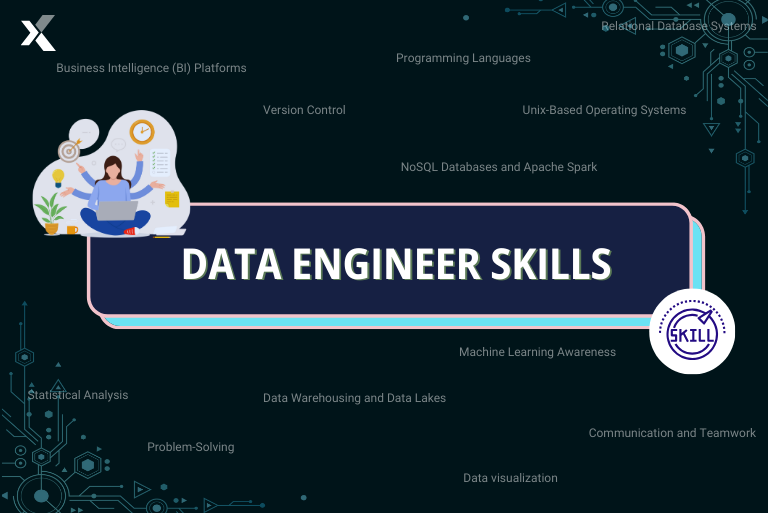
Data must have excellent knowledge of computer science fundamentals, strong problem-solving skills, and deep expertise in at least one programming language. Here’s a comprehensive overview of essential data engineer knowledge and skills areas required for a successful career in data engineering:
- Programming Languages: Mastery of C#, Java, Python, R, Ruby, Scala, and SQL, with a strong emphasis on Python, R, and SQL for data manipulation and analysis.
- ETL Tools and REST APIs: Proficiency in ETL (Extract, Transform, Load) tools and REST-oriented APIs for creating, managing, and automating data integration workflows.
- Data Warehousing and Data Lakes: In-depth understanding of data warehousing concepts, data lakes, and experience with technologies like Hadoop, which offloads processing and storage work for big data analytics.
- NoSQL Databases and Apache Spark: Expertise in NoSQL databases (e.g., MongoDB, Cassandra) and Apache Spark for handling large-scale data processing and analysis.
- Relational Database Systems: Knowledge of relational database systems, including MySQL, PostgreSQL, and Oracle, for structured data management.
- Lambda Architecture: Familiarity with Lambda architecture, enabling the creation of unified data pipelines supporting batch and real-time data processing.
- Business Intelligence (BI) Platforms: Proficiency in configuring and utilizing BI platforms (e.g., Tableau, Power BI) to connect data sources, create interactive dashboards, and facilitate data-driven insights.
- Machine Learning Awareness: Understanding of machine learning concepts and practices, allowing Data Engineers to prepare data for machine learning models and derive insights from them.
- Unix-Based Operating Systems: Knowledge of Unix, Solaris, and Linux operating systems, providing advanced control and flexibility for managing data environments.
- Cloud Computing: Familiarity with cloud platforms such as AWS, Azure, or Google Cloud, including leveraging cloud services for data storage, processing, and scalability.
- Data Modeling: Competence in data modeling techniques and tools for designing efficient data structures.
- Version Control: Proficiency in version control systems like Git for managing code and collaborating with other team members.
- Data Security: Understanding of data security best practices to protect sensitive information and maintain compliance.
- Statistical Analysis: Basic knowledge of statistics to support data analysis and modeling tasks.
- Data Visualization: Familiarity with data visualization tools (e.g., Matplotlib, ggplot) to create meaningful visual representations of data.
- Problem-Solving: Strong problem-solving skills to address complex data challenges and find innovative solutions.
- Teamwork and Communication: Effective communication and teamwork skills to collaborate with clients, colleagues, and cross-functional teams.
Data Engineer: Qualifications Required
Data engineers are expected to possess various qualifications for success in the job. Some data engineer qualifications include the following:
- Bachelor’s degree in Computer Science or related field
- Familiarity with machine learning algorithms
- Effective communication and teamwork abilities
- Strong problem-solving skills and attention to detail
- Knowledge of ETL processes and data modeling techniques
- Familiarity with ETL tools, REST APIs, and data integration techniques
- Understanding of programming languages such as Java, Python, and Ruby on Rails
- Understanding of data security and compliance best practices
- Knowledge of data warehousing, data lakes, and cloud computing
- Ability to develop clear, efficient, scalable solutions for complex problems
- Experience with relational database systems (RDBMS) and non-relational databases (NoSQL)
How do Data Engineers Add Value?
The requirements for data engineers are growing in the modern business world. Data engineer roles and responsibilities are instrumental in understanding the vast volumes of data better so that informed decisions can be made with the insights provided by it.
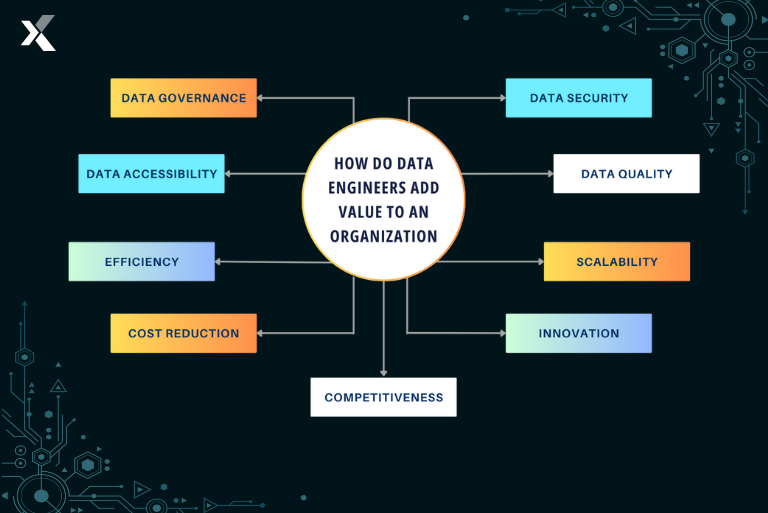
They are delivering value to organizations in several ways:
-
Data Governance
Data engineers are responsible for developing data governance frameworks and strategies. They ensure the data is stored, maintained, and accessed securely with appropriate controls.
-
Data Security
Data engineers ensure the data is not exposed to unauthorized personnel or malicious actors. They develop various security protocols to ensure the safety of data.
-
Data Accessibility
Making data from various sources readily accessible and integrated is one of the most important data engineering skills. They help in breaking down data silos that often hinder effective decision-making and facilitate collaboration among teams across the organization.
-
Data Quality
Implementing robust data quality checks and processes is among the critical data engineer roles and responsibilities. By maintaining data accuracy and reliability, they ensure that the insights derived from data are trustworthy.
High-quality data forms the foundation for making sound decisions, reducing the risk of costly errors.
-
Efficiency
Through the automation of data processes and the optimization of data pipelines, data engineers enhance operational efficiency. It saves time and reduces the risk of human errors while handling data. Data processes become streamlined and less resource-intensive.
-
Scalability
Designing systems that can seamlessly scale to accommodate growing data volumes is among the valuable skills for data engineers. Scalability ensures an organization’s data infrastructure can handle data growth without significant disruptions or costly overhauls.
-
Cost Reduction
Efficient data management, orchestrated by data engineers, can lead to significant cost savings. By optimizing data storage, processing, and data transfer, organizations can reduce their overall expenses related to data infrastructure.
-
Innovation
Data engineers empower organizations to innovate by providing the necessary foundation for data-driven products and services. They support machine learning initiatives, real-time data analytics, and the development of predictive models, fostering innovation and driving the creation of new revenue streams.
-
Competitive Advantage
In today’s data-driven landscape, organizations that can swiftly turn their data into actionable insights gain a substantial competitive advantage. Data Engineers are pivotal in ensuring that data becomes a strategic asset rather than a liability, positioning the organization ahead of its peers.
How to Become a Data Engineer?
Data engineering is a growing field that requires acquiring the data engineer skill set comprising expertise in data systems, programming, and operations. If you want to become a data engineer, you must invest time and energy into developing data engineering skills through education, training, and experience.

Here is an eight-step process to become a data engineer:
-
Foundational Education
Begin by obtaining a bachelor’s degree in a relevant field, like Computer Science, Information Technology, or Data Engineering. A strong educational foundation provides essential knowledge of computer science principles.
You can choose any online course that offers degrees and certifications in the fields of Big Data, Data Science, Machine Learning, Artificial Intelligence, etc. Having a solid background in these areas will ensure you have the necessary skills to become a successful data engineer.
-
Technical Mastery
Develop proficiency in SQL and NoSQL databases. Learn essential programming languages like R, Python, and Java. These are critical for data manipulation, automation, and data pipeline development.
You must also be adept with data visualization tools such as Tableau and D3, ETL (Extract-Transform-Load) tools like Talend, and cloud computing technologies like AWS or Google Cloud.
-
Proficiency in Database Management
Understanding database management systems (DBMSs) is essential for a data engineer. DBMSs are used to store, access, and manipulate the data that flows through the system. It is important to understand how different databases work and how to use them efficiently.
- SQL Databases: Gain expertise in relational databases like MySQL, PostgreSQL, or SQL Server. Understand schema design, optimization, and database administration.
- NoSQL Databases: Explore NoSQL databases like MongoDB or Cassandra, which are crucial for handling unstructured data.
-
Certify Your Skills
Consider pursuing relevant certifications to validate your expertise and boost your career prospects. It will demonstrate your knowledge of data engineering principles and best practices. Certification from a reputed and industry-recognized learning platform like AnalytixLabs will help you stand out from other applicants in the job market.
-
Demonstrate Your Abilities
Create a robust portfolio showcasing your data engineer skills and problem-solving abilities. Develop projects that demonstrate your expertise in all critical data engineer skills required by organizations:
- Data Pipelines: Build data pipelines to extract, transform, and load (ETL) data from various sources.
- Database Projects: Design and optimize databases, ensuring data integrity and performance.
- Real-World Data Analysis: Work with real datasets to derive insights and make data-driven decisions.
Having a portfolio of completed data engineering projects that you can show to potential employers is invaluable.
-
Gain Hands-On Experience
Working on real-world projects is the best way to understand what a data engineer does. Seek internships or entry-level positions such as Junior Data Engineer or Data Analyst to gain hands-on experience and learn how data engineering is used in the real world. Practical experience allows you to apply your data engineering skills in real-world scenarios and build a professional track record.
-
Networking
Networking with other professionals in the field of data engineering is important for any aspiring data engineer. Join professional organizations, attend industry meetups, and connect with professionals in the field.
Networking can help open doors to job opportunities, mentorship, and collaborations. You can easily stay updated on industry trends and gain valuable insight from experienced professionals.
-
Continuous Upgrading
Data engineering is a constantly evolving field, and it is important to stay updated on the latest trends. Invest in continuing education courses such as online classes, conferences, and seminars.
Continuous learning ensures that your skills remain relevant and adaptable to emerging technologies. You must stay updated by ensuring you are not missing out on any new developments in the field.
Exploring the Data Engineer Career Path

A data engineer’s career path is an exciting one with a lot of potential for growth. It may vary depending on the industry, the organization, and the individual’s experience level. However, the general data engineer qualifications open doors to the following avenues:
Entry-Level Positions
Most Data Engineers start their careers in entry-level positions such as Junior Data Engineer or Data Analyst. You need basic data engineer qualifications for these roles and will gain foundational skills in data management, database systems, and basic data integration. You work on smaller data projects, learning the roles of data infrastructure and data cleaning.
Mid-Level Roles
As you accumulate experience and data engineer skills required you may progress to mid-level positions like Data Engineer or Data Integration Engineer. You will tackle more complex projects, design data pipelines, and work with a broader range of data technologies. They become adept at optimizing data workflows and handling larger datasets.
Senior Data Engineer
After gaining substantial experience, you may advance to Senior Data Engineer roles. In these positions, you will take on greater data engineering responsibilities, often leading teams. You will design and manage complex data infrastructures. All skills required for data engineering will be critical and help you in strategic decision-making related to data architecture.
Data Architect
Data Engineers transition into Data Architect roles after several years of experience. They focus on high-level data system design. They work closely with business stakeholders to create data strategies that align with the organization’s objectives. Data Architects are responsible for ensuring that data systems support the long-term goals of the business.
Specialization
Within the Data Engineering field, individuals can specialize based on different data engineer job requirements. Specializations include big data engineering, cloud data engineering, or data pipeline optimization. These specializations cater to specific skills and technologies, making you a highly sought-after professional in particular niches.
Leadership Roles
Experienced Data Engineers may climb the corporate ladder into leadership roles. You can become a Data Engineering Manager or Director of Data Engineering. These positions involve overseeing entire teams, multiple projects, and the overall data strategy for an organization. Leadership roles require a combination of technical expertise and managerial skills.
Consulting and Freelancing
As an experienced data engineer, you may choose to become a consultant or freelancer. You may offer your expertise to multiple clients or organizations and brush up your data engineer skills by working on diverse projects. It offers independence and the flexibility to work on varying data engineer requirements.
Conclusion
In today’s data-driven era, data engineering is the bedrock of transformative decision-making, innovation, and competitive advantage. Its importance cannot be overstated.
The demand for Data Engineers is surging worldwide. According to the Dice Tech Job Report, job postings for data engineering roles have increased by over 50%. The scope is monumental, with the U.S. Bureau of Labor Statistics projecting a 35% growth rate from 2022 to 2032, outpacing most other professions.
A career in data engineering is an opportunity to be at the forefront of the data revolution. It is about wielding data’s immense power to shape the future of the global economy. Data engineering offers boundless opportunities for those who wish to craft a meaningful, impactful, and prosperous career.
Frequently Asked Questions
-
What skills do data engineers need?
Data engineers help with analyzing data and identifying patterns and trends. They also help develop predictive models to help organizations make data-driven decisions. All these tasks demand strong programming skills, particularly in languages such as Python, Java, and Scala.
A data engineer should have a thorough knowledge of database systems and distributed computing systems. An understanding of big data technologies such as Hadoop, Kafka, and Spark. They must be familiar with popular cloud platforms such as AWS, Google Cloud, and Azure.
-
Do data engineers need coding skills?
Coding is among the highly valued and most critical data engineer skills required for most data engineering positions. Besides SQL, data engineers use other programming languages for various tasks. Most data engineer descriptions mention candidates must have some basic understanding of programming languages such as Python, MatLab, Perl, C, and C++.
Among programming languages, Python is the most sought-after in data engineering. It seamlessly integrates with essential tools like Apache Airflow and Apache Spark, which are crucial for everyday tasks. Additionally, familiarity with Java or Scala may be necessary if an organization employs open-source frameworks running on the Java Virtual Machine.
-
What is the most important skill in data engineering?
To be a successful data engineer, you must have thorough programming skills, analytical skills, statistics knowledge, and a clear understanding of big data technologies. In fact, data engineers need to be able to think strategically and identify potential problems before they happen.
Additionally, you should have a solid background in mathematics, including knowledge of algorithms, calculus, and linear algebra. Besides technical skills, data engineers need to possess excellent communication skills and problem-solving abilities to effectively collaborate with other team members to develop effective solutions. Soft skills like concise writing and time management are also important.
-
What is my role as a data engineer?
Data engineer responsibilities include developing, constructing, testing, and maintaining enterprise-grade IT architectures such as databases and large-scale processing systems. You will often be assigned tasks like designing scalable data pipelines, optimizing data storage and retrieval, integrating various data sources, and ensuring data quality.
Data engineers play a vital role in contributing to providing reliable and accessible data for analysis by data scientists, analysts, and other stakeholders within the organizations. Therefore, you will collaborate with data analysts, data scientists, software engineering teams, product managers, business stakeholders, and other IT personnel to develop processes and tools.

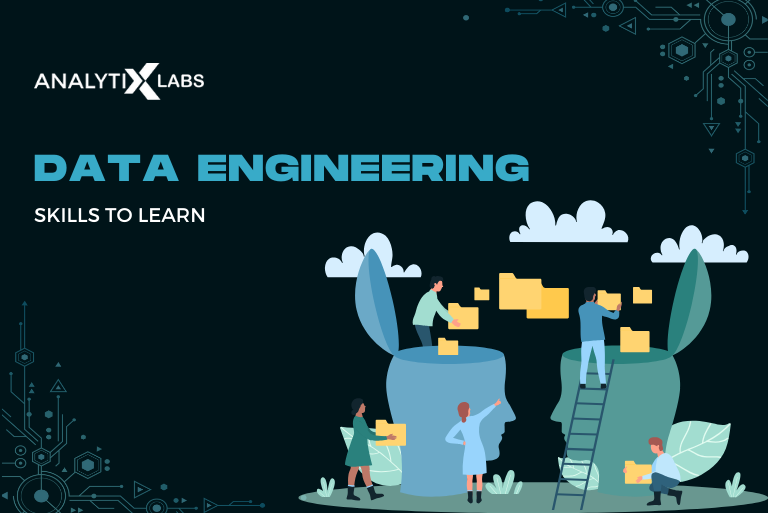







1 Comment
This is a fantastic resource! I’m just starting out on the path to becoming a data engineer, and this article lays out a clear roadmap of the skills I need to develop. Thanks for including the section on cloud platforms – that’s an area I’m particularly interested in learning more about.